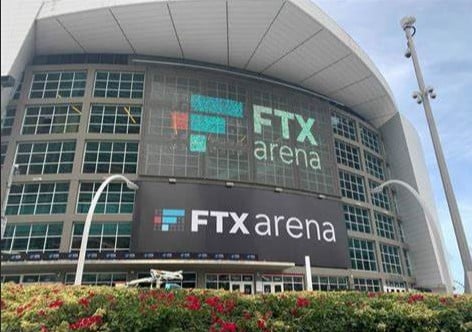FTX Arena joins the long list of stadiums and arenas named after companies that have gone bust. It’s a curse.
In yesterday’s complaint from the Commodity Futures Trading Commission against FTX, it’s noted that FTX did much over the past couple of years to promote its name.
In the complaint, the CFTC notes that an arena in Miami was named after the company.
The FTX Arena is where the Miami Heat play basketball. The Arena still shares this on its website:
Miami’s FTX Arena is an international, versatile venue in a vibrant waterfront setting that showcases world-class and sophisticated events. Located in Downtown Miami on the waterfront of Biscayne Bay, the Arena is positioned between the skyline of the city, the beautiful beaches and the nightlife of South Beach.
FTX.us is a young and exciting crypto currency exchange that continues to grow at lightning speed. The company seeks to offer US traders a platform that inspires their loyalty, as well as expand access to a new generation of financial tools and services to people around the US and across the world.
Located in the center of booming Downtown Miami and the Entertainment District, FTX Arena hosts 80+ non-basketball events each year. Including A-list concerts, family shows, sporting events, National Conferences, and more.
It looks like the arena has some updates to make on its site.
Ironically this isn’t the first stadium or arena in the US to be named after a corporation that has gone bust.
Back in 2013, there was already a large list of arenas and stadiums named after companies long gone.
CMGI Field –
CMGI originally entered into a 15-year, $114 million deal in 2000 for the naming rights to the home of the New England Patriots, but the company dropped the big sponsorship contract before the team’s first game in the newly-named stadium. Another victim of the dot-com bubble.
The naming rights for Toronto’s major stadium, which is also known as the ACC or the “Hangar,” predated the bankruptcy of Canada’s largest airline. Four years after the stadium opened in 1999, Air Canada filed for bankruptcy, throwing the $1.5 million a year rights deal into question.
Perhaps the biggest and most well-known faux pas in stadium naming, Enron Field was a PR disaster for the Houston Astros after the sponsoring company, Enron, was flung into bankruptcy after its infamous corporate scandal. The Astros had signed the naming deal in 1999, when Enron was seen as a Wall Street darling. Two years later, Enron collapsed.
National Car Rental, a subsidiary of ANC Rental, won the naming rights to the home of the Florida Panthers prior to the stadium’s opening in 1999. However, in 2002 ANC filed for bankruptcy and the stadium, which is now known as the BankAtlantic Center, required a name change.
PSINet Stadium –
The home of the Baltimore Ravens, once known as PSINet Stadium, felt the hurt of the dot-com bubble burst after it’s sponsor, PSINet, filed for bankruptcy after only two seasons under the name. PSINet was one of the first internet service providers in the country.
United Center
United Airlines held stadium naming rights to Chicago’s major stadium prior to its 2002 bankruptcy. There were numerous factors behind the airline’s bankruptcy filing, including the economic turmoil in the wake of 9/11, skyrocketing oil prices and the dot-com bubble burst, which significantly hurt its profitable routes.
Adelphia Coliseum
In 1999, Adelphia Communications signed a 15-year, $30 million deal to name the Nashville Stadium after the company. At the time it was the fifth largest cable company in the US, but after widespread internal corruption the company filed for bankruptcy in 2002, and the naming contract was dissolved.
St. Louis built the stadium, in part, to lure an NFL team to the city, and TransWorld won the rights to name it. But almost as soon as the stadium opened in 1995, TransWorld filed for bankruptcy after crippling contracts severely damaged their profit model.
Citi Field or Bailout Ballpark? That was critics were saying after Citigroup was caught in the throes of the financial crisis. On the heels of annoucing a naming deal that cost Citigroup $20 million a year over 20 years, the company was forced to take $45 billion in government bailouts and saw its stock price drop nearly 94 percent from its November 2006 levels. Because of the heavy taxpayer support given to Citigroup, lawmakers began urging the company to scrap the names rights deal. But the company stuck with its plans, and has managed to avoid bankruptcy.
Known as the “Phone Booth” as it has passed from one telecommunications company to another, the MCI Center was owned by MCI WorldCom until the company went bankrupt in 2004. At the time, WorldCom’s bankruptcy filing was the largest in US history. The stadium has since become known as the Verizon Center after the telecom giant acquired what remained of Worldcom’s assets.
Joe Robbie Stadium, built in 1987, was renamed Pro Player Park, and later Pro Player Stadium after a subsidiary of Fruit of the Loom won naming rights. Although Fruit of the Loom filed for Chapter 11 bankruptcy protection in 1999, Pro Player remained the name of the park until 2005, despite the brand’s corporate liquidation in 2001.
Wachovia acquired the stadium’s naming rights in 2003 after absorbing First Union Bank. Then, in the midst of the credit crisis, Wachovia was purchased by Wells Fargo in 2008.
The above list was only through 2013. We can now add FTX Arena to the list.




